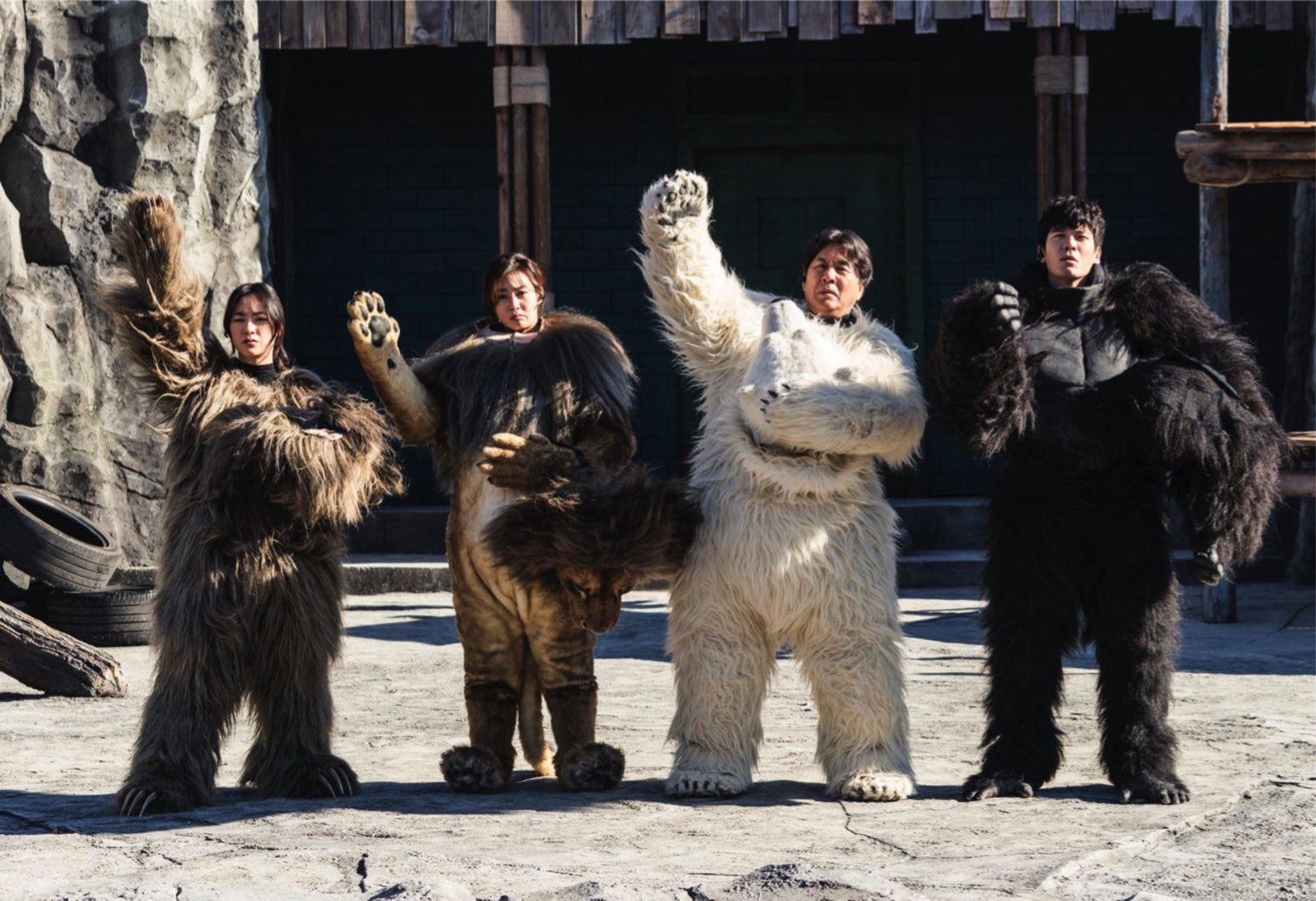
Imagine a zoo whose polar bear drinks Coca-Cola, just like in the commercials. Would you post the bear on Instagram? Or would you report it as a fraud? That image forms a key part of Secret Zoo—which debuted in Korea to strong ticket sales, and will screen in select US theaters starting January 24, 2020. In this Korean comedy, a motley cast of characters tries to save a bankrupt zoo by dressing up as animals. The film mixes lighthearted humor with low-key social commentary, offering a heartwarming but passionless viewing experience.
“Normalizing” A Zoo
Adapted from a popular webcomic, Secret Zoo starts off with an introduction to primary protagonist Kang Tae-soo (played by Ahn Jae-hong). A junior temp employee at one of Korea’s top law firms, Kang desperately wants to work as a full-fledged mergers and acquisitions (M&A) attorney. One day, the firm’s CEO notices Kang and gives him an unusual assignment. The firm has taken control of a bankrupt zoo, and if Kang can “normalize” the zoo’s finances in three months as its temporary director, he can become a M&A attorney.
Kang seizes the opportunity, zooms over to the zoo, and discovers that creditors seized all the most valuable animals. He quickly convinces a small group of remaining zoo employees to wear animal suits and act as animals—a concept that goes viral when Kang accidentally drinks Coca-Cola while wearing a polar bear suit. Huge crowds flock to the zoo, and revitalize its finances—but more challenges await Kang and his plucky crew.
Lightness of (Animal) Being

Secret Zoo maintains an overall lighthearted tone, with few moments of heavy dramatic tension. There are slight instances of disagreement between characters, but nothing too contentious. We see a low-key love triangle, and tensions between Kang and his higher-ups, but no major pushback around the main premise of humans pretending to be zoo animals. The zoo’s revitalization through virality feels mostly predictable, as does the movie’s ending.
Most of the Secret Zoo’s humor comes in physical and situational forms, with a few instances of wordplay (ex. Kang giving the animals uncreatively similar names) sprinkled in. It’s generally simplistic—there are no jokes with long setups or intricately crafted premises akin to what you might expect from an Edgar Wright comedy, for instance. This makes Secret Zoo highly accessible and easy to laugh along with, but also easily forgettable. The film feels as light as a feather. You’re tickled in the moment, but quickly forget the sensation thereafter.
Laughs, Not Commentary

Another manifestation of Secret Zoo’s overall “lightness” comes in its halfhearted approaches to social commentary. The philosophical implications of humans pretending to be animals, and the ethics of keeping animals locked up in cages all day, do come up in the movie—but don’t make any appreciable splash.
For example, Kang and the zoo’s lead veterinarian look after a (real) polar bear named Black Nose, who’s miserable in captivity. While Black Nose’s plight eventually factors into some of Kang’s decisionmaking later in the film, it feels superficial as we don’t really see Kang or other characters undergoing significant mindset changes because of it. Kang doesn’t go from rapacious capitalist to animal rights activist; he’s a pretty humdrum “nice guy” both at the movie’s beginning and end.
Secret Zoo also contains slight, but not particularly meaningful, jabs at corporate greed and wealth inequality in Korea. Kang’s downtrodden early-career millennial character feels reminiscent of the struggling male leads in comedies like Exit and financial dramas like Money, but with far less angst. Through scenes like a zoo employee protest, the film halfheartedly tries to frame the zoo’s struggle to stay alive within anti-corporatist terms. However, because victories come so easily to Secret Zoo’s protagonists, viewers have neither time nor reason to empathize with their plight.
Overall, the lack of struggle or heavy social commentary allows Secret Zoo to retain a wholesome, heartwarming quality. Audiences can feel good about the characters as they use quirky methods to execute an otherwise noble vision, and overcome perfunctory obstacles. However, viewers looking for lasting emotional resonance may find Secret Zoo a suboptimal habitat.
• • •
Secret Zoo (Korean: 해치지않아)—South Korea. Dialog in Korean. Directed by Son Jae-gon. First released January 15, 2020. Running time 1hr 57min. Starring Ahn Jae-hong, Kang So-ra, Park Young-gyu.
Secret Zoo is currently screening across South Korea and begins screening January 24, 2020 in select theaters around Los Angeles, with a broader US release on February 7, 2020.
